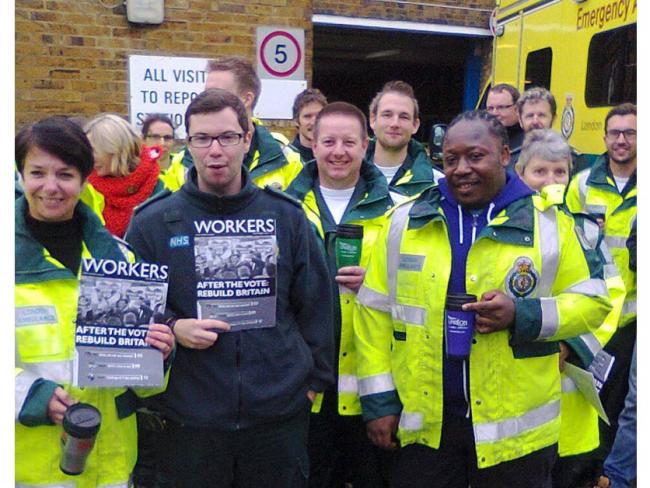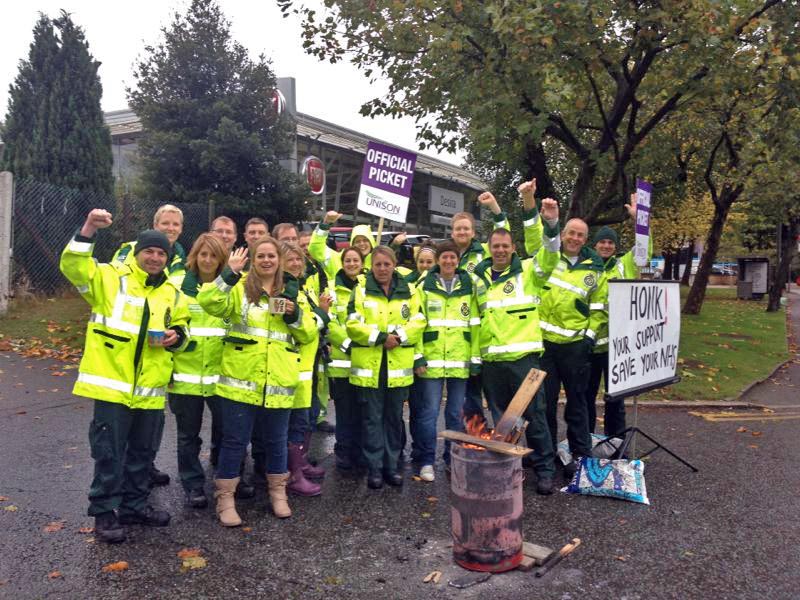
London, 13 October. Pickets outside Edmonton ambulance station. Photo Workers.
[This is a longer version of the article that appeared in the printed edition Workers, November 2014. To read the shortened print version, please see the PDF of the issue.]
Nowadays there is an assiduously created idea that workers are weak, that trade unions don’t matter, and that industrial action doesn’t achieve anything. The first strikes in the NHS for 32 years on 13 October gave the lie to that – especially in the London Ambulance Service.
Unison agreed a “life & limb” policy designed to keep Londoners safe by arranging emergency cover to be deployed from picket lines. Despite the agreement being made on 6 October, and signed off on 8 October, LAS management were secretly in discussion with the armed forces, via NHS England, to try to break the strike – or to “add additional resources” to those provided by striking workers, as their propagandists put it.

So after office hours on Friday 10 October the news dribbled out that almost 200 soldiers, sailors, air force personnel and Metropolitan Police officers would be used in place of ambulances during the strike. They were to be used to drive LAS vehicles which would be surreptitiously taken from ambulances stations in the dead of night on the Sunday so as to avoid crossing picket lines set up at 07:00 on the Monday.
Over the weekend Unison carefully sought views of members, and worked hard to avoid the provocation that the government clearly intended. The union would have been entitled to withdraw from the agreement it had signed as that agreement had effectively been torn up by the employer’s approach the employer to the Ministry of Defence. But such a response would then have been used by Downing Street in its campaign to criminalise trade union activity, and ultimately members, in the emergency services.
‘The union has faced down the might of the state. But only for now.’
In the event the union’s emergency plans worked, with many examples of crews deploying from picket lines to save lives. In contrast stories abounded of ambulances crewed by soldiers being unable to cope with trauma patients, and groups of training managers refusing en bloc to be driven to jobs by squaddies. The strength of confidence of the workers involved has definitely been enhanced, and the union has faced down the might of the state. But only for now.
Would all that military intervention have been necessary if the planned strike action – only four hours after all – was going to be a “damp squib” as Cameron so arrogantly (as inaccurately) branded the pensions strike in 2011? Of course not. The government was desperate to hide from Londoners the power of organised workers. Organised workers showed that power by keeping their eyes on the real enemy, the government, and not being tricked into leaving Londoners to die.
For workers to win the pay rise they seek more action will be needed. Unions will have to be as careful, considered and yet bold as Unison has been in the run-up to and during this strike.
• See companion articles: Midwives act on pay, staffing, NHS strike: News from hospitals.
